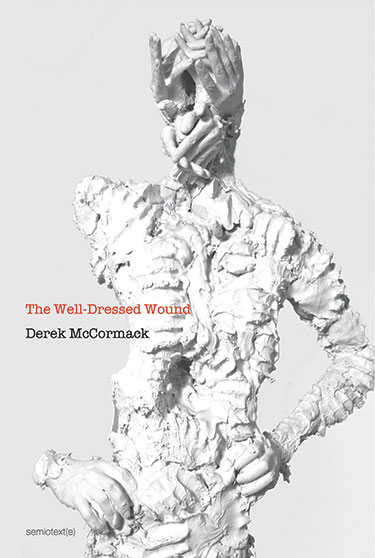 The Well-Dressed Wound
The Well-Dressed Wound
Derek McCormack, 72 pages, Semiotext(e)/MIT Press, mitpress.mit.edu, $12.95
I’m here for experimental, in-your-face, transgressive literature. I’ll read you Kathy Acker before bed and wake you up in the morning with Severo Sarduy. But I don’t know what Derek McCormack is going for in his new play The Well-Dressed Wound, though I want to, real bad. It is abrasive, but intentionally so. It implies a necessary purpose for it; the pages shock at times, but fore some obscure reason better than for sake of it. I longed to find some interpretive anchor in the loudness, but I was ultimately suffocated as I tried to move around in the highly charged language and scenarios McCormack creates.
The book takes the loose and very de-centered form of a playbook séance for Abraham and Mary Todd Lincoln’s dead gay son. But the real star is the caustic, spastic rendering of fashion designer Martin Margiela as the devil himself (fabulous, truly). Margiela gleefully extolls the wasting bodies and impending doom of untreated AIDS patients as “the future of fashion,” and screams sickeningly about “faggots” shitting, pissing, and cumming in various orifices because they love to die.
All of this is punctuated by near-blank pages marked “Cum:” and “Margiela’s confetti,” great heaps of dialogue composed of only spaces and exclamation points, lists describing fashion collections and occasional references to the Civil War.
It might be fun, in an intensely sadistic trauma camp sort of way, but it is disturbing at the same time. McCormack is known to be confrontational, brashly queer, and he always writes tersely about dark shit, but I think this is his wildest piece yet, in a way that made me get off the train. I feel drained and upset reading about “faggots dying from AIDS,” which is the point. But eventually I lost the understanding of who this was for, or why he was writing it. Trauma camp. Disco hospital. The future of fashion. It’s pretty desolate.
The play format renders the barrage of voices and shrieks all the more cacophonous, and I challenge anyone to adapt this for stage (no, really!). This feels like a practice in some dense theory and a lot of pain, and its publication by queer intellectual vanguard press Semiotext(e) confirms that we aren’t really allowed to get it. So again, I’m missing something. The Derridean prose and form is at least a fun challenge — I do like feeling dizzy at a page. If you do too, go for a ride with Martin Margiela. I can’t tell you for sure where you’ll end up and you won’t thank me later. (Jonathan Valelly)
